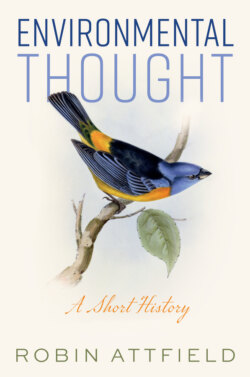Читать книгу Environmental Thought - Robin Attfield - Страница 10
Empedocles
ОглавлениеIt is time for philosophy to enter the story. During the sixth and fifth centuries BCE, philosophy arose among the Greeks of Miletus in Asia Minor, and spread to the Greek colonists of Italy and Sicily. Several wrote tracts on the true or underlying nature of nature. For present purposes, our focus will be on the Sicilian Greek, Empedocles of Acragas (c. 490–430 BCE), not because he was the most profound of the Greek philosophers, but because of his unique contributions, centrally relevant to how we should understand nature.
Empedocles was probably a Pythagorean (or follower of Pythagoras), believing in reincarnation, and in the possibility of returning as an animal. This may be why he advocated vegetarianism (Coates 1998: 33), a minority stance in the ancient world, but one followed much later by some of the Neoplatonists. The possibility of humans being transformed into animals was later to be explored by the Roman poet Ovid (43 BCE–17 CE) in his Metamorphoses (a work of great influence in the Renaissance period). In faraway China it was also developed in the late fourth century BCE by Zhuangzi, who imagines a fish being transformed into a giant bird, to the amazement of smaller creatures. Zhuangzi’s aim was to show us how different from our own the perspective of the large bird would be, and thus how we can be liberated from our habitual, narrow human perspectives (Hourdequin 2015: 82–3). I am not suggesting any influence from the Pythagoreans of the West to the Daoists of China (or vice versa), or from or to either school to or from the Jains of sixth-century India who also taught respect for all creatures, but rather that all three of these schools of thought can open up the possibility of transcending perspectives focused on human beings alone.
We would, however, be mistaken if (with Hughes) we trace environmentalism back to the ancient Pythagoreans, whose stance was an ascetic, dualistic and ritualistic one, and for whom there is no evidence of belief in the vulnerability of species, conservation or concern for sustainability. Nor (come to that) should we credit the ancient legend that Empedocles died by casting himself into the crater of Mount Etna, despite Matthew Arnold’s poem depicting his death in this manner.
Perhaps Empedocles’ most original contribution was his theory of the evolution of living creatures by a kind of natural selection. At one stage, he held, all kinds of monstrosities came into being, alongside the ancestors of surviving creatures, but the monsters did not prove viable, and thus the range of species was winnowed down to those that survive today. Aristotle later poured scorn on this theory, although Epicurus (fourth to third centuries BCE) adopted a revised form of it. Much later still, Charles Darwin acknowledged Empedocles as a predecessor for his different but related theory; indeed, Darwin wrote of Empedocles: ‘We see here the principle of natural selection shadowed forth’ (Burrow 1985: 53). Empedocles combined this theory with belief in the kinship of human beings and (other) animals, a belief seldom recaptured until the time of Darwin.
Empedocles also devised the theory that everything is made of the four elements, earth, air, fire and water, his solution to the problem of finding something permanent that underlies change. This theory was enthusiastically adopted by Aristotle, and in consequence was held in high favour until the atomic theory was gradually adopted instead by seventeenth-century scientists. Atomism itself was put forward by Democritus of Abdera (fifth century BCE), and adopted in the later ancient world by Epicurus and his followers; but the authority of Aristotle overshadowed it for two thousand years. The four-element theory could be seen as a false start; but it remained an important contribution to people’s understanding of nature for centuries to come. Understanding historical attitudes to nature cannot be limited to successful theories, as if ancient people were trying to anticipate modern findings; that approach is prone instead to mischaracterize the past, and to underestimate its distinctiveness. Nevertheless, Empedocles’ speculative theory of evolution by natural selection was eventually found to be partially (and almost accidentally) on target by nineteenth- and twentieth-century scientists (see Chapter 3).
